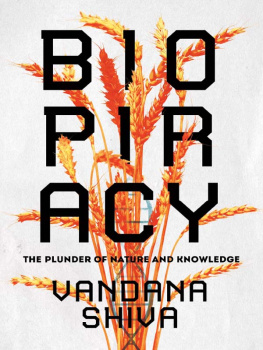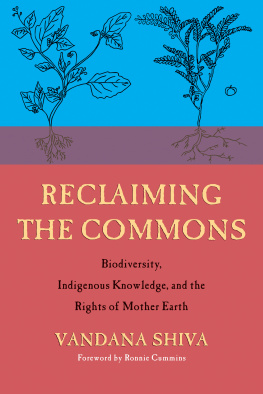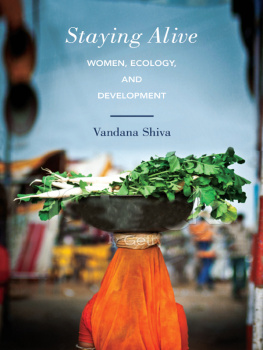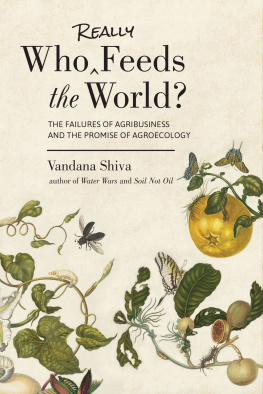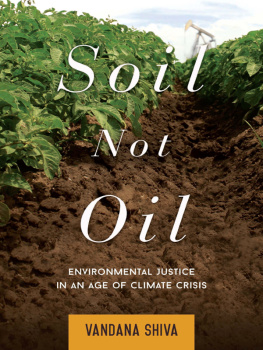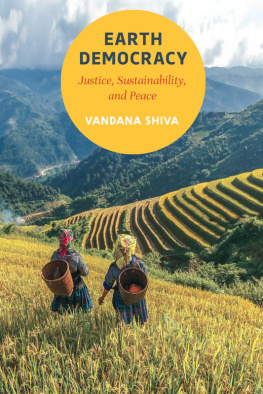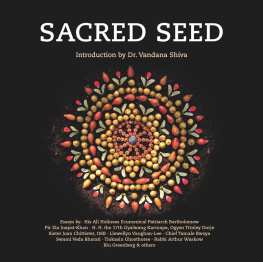
BIOPIRACY
BIOPIRACY
The Plunder of Nature
and Knowledge
VANDANA SHIVA

Berkeley, California
Copyright 1999, 2016 by Vandana Shiva. All rights reserved. No portion of this book, except for brief review, may be reproduced, stored in a retrieval system, or transmitted in any form or by any meanselectronic, mechanical, photocopying, recording, or otherwisewithout the written permission of the publisher. For information contact North Atlantic Books.
Published by
North Atlantic Books
Berkeley, California
Cover photo iStockphoto.com/EmiSta
Cover design by Jasmine Hromjak
Book design by Adept Content Solutions
Printed in the United States of America
Previously published in 1999 by South End Press.
Biopiracy: The Plunder of Nature and Knowledge is sponsored and published by the Society for the Study of Native Arts and Sciences (dba North Atlantic Books), an educational nonprofit based in Berkeley, California, that collaborates with partners to develop cross-cultural perspectives, nurture holistic views of art, science, the humanities, and healing, and seed personal and global transformation by publishing work on the relationship of body, spirit, and nature.
North Atlantic Books publications are available through most bookstores. For further information, visit our website at www.northatlanticbooks.com or call 800-733-3000.
Library of Congress Cataloging-in-Publication Data
Names: Shiva, Vandana, author.
Title: Biopiracy: the plunder of nature and knowledge / Vandana Shiva.
Description: Berkeley, California: North Atlantic Books, 2016. | Includes index.
Identifiers: LCCN 2015044147| ISBN 9781623170707 (paperback) | ISBN 9781623170714 (e-book)
Subjects: LCSH: Biopiracy. | Biotechnology--Patents. | BISAC: POLITICAL SCIENCE / Public Policy / Environmental Policy. | SOCIAL SCIENCE / Feminism & Feminist Theory. | POLITICAL SCIENCE / Globalization.
Classification: LCC K1519.B54 S53 2016 | DDC 346.04/86--dc23
LC record available at http://lccn.loc.gov/2015044147
1 2 3 4 5 6 7 8 9 printer 21 20 19 18 17 16
I wrote Biopiracy to explore the ethical, ecological, and economic consequences of patents on life. There were no biopiracy cases yet, but it was evident that when everything is patentable, the biodiversity and indigenous knowledge of countries of the South will also be patented. The door to patents on seed and patents on life was opened by genetic engineering. By adding just one new gene to the cell of a plant, corporations claimed they had invented and created the seed, the plant, and all future seeds, which are now their property. In other words, GMO meant God, Move Over. Big Biotech claimed legal personhood and the role of creator. They have declared seed to be their invention, their patented property. A patent is an exclusive right granted for an invention, which allows the patent holder to exclude everyone else from making, selling, distributing, and using the patented product. With patents on seed, this implies that the farmers rights to save and share seedsomethingfarmers have done for millenniais now defined as theft, an intellectual property crime.
In defining seed as their creation and invention, corporations like Monsanto shaped the Global Intellectual Property and Patent Laws so that they could legally prevent farmers from saving and sharing seeds. This is how the Trade-Related Intellectual Property Rights (TRIPS) Agreement of the World Trade Organization was born. Article 27.3(b) of the TRIPS Agreement states: Parties may exclude from patentability plants and animals other than micro-organisms, and essentially biological processes for the production of plants or animals other than non-biological and microbiological processes. However, parties shall provide for the protection of plant varieties either by patents or by an effective sui generis system or by any combination thereof. This misnamed protection of plant varieties is precisely what prohibits the free exchange of seeds between farmers, threatening their subsistence and ability to save and exchange seeds amongst one another.
The TRIPS clause on patents on life was due for a mandatory review in 1999. In its submission, India stated, Clearly, there is a case for re-examining the need to grant patents on lifeforms anywhere in the world. Until such systems are in place, it may be advisable to exclude patents on all lifeforms.
The African group added:
The African Group maintains its reservations about patenting any life forms as explained on previous occasions by the Group and several other delegations. In this regard, the Group proposes that Article 27.3(b) be revised to prohibit patents on plants, animals, micro-organisms, essentially biological processes for the production of plants or animals, and non-biological and microbiological processes for the production of plants or animals. For plant varieties to be protected under the TRIPS Agreement, the protection must clearly, and not just implicitly or by way of exception, strike a good balance with the interests of the community as a whole and protect farmers rights and traditional knowledge, and ensure the preservation of biological diversity.
Life forms, plants, and seeds are all evolving, self-organized, sovereign beings. They have intrinsic worth, value, and standing. Owning life by claiming it to be a corporate invention is ethically and legally wrong. Patents on seeds are legally wrong because seeds are not an invention. Patents on seeds are ethically wrong because seeds are life forms; they are our kin, members of our earth family.
Life is Not an Invention
IPRs expanded to cover living systems and organisms is a distortion of innovation and invention. This distortion was introduced by corporations such as Monsanto in the TRIPS (Trade-Related Intellectual Property Rights) Agreement of the WTO. Corporate influence on patent law began with the drafting of the TRIPS Agreement of the WTO by the Intellectual Property Committee (IPC) of multilateral corporations.
As I have written in Biopiracy, James Enyart of Monsanto is on record illustrating just how deeply the TRIPS agreement is aligned to corporate interest and against the interests of nations and their citizens:
Once created, the first task of the IPC was to repeat the missionary work we did in the U.S. in the early days, this time with the industrial associations of Europe and Japan to convince them that a code was possible.
Besides selling our concepts at home, we went to Geneva where [we] presented [our] document to the staff of the GATT Secretariat. We also took the opportunity to present it to the Geneva-based representatives of a large number of countries What I have described to you is absolutely unprecedented in GATT. Industry has identified a major problem for international trade. It crafted a solution, reduced it to a concrete proposal, and sold it to our own and other governments The industries and traders of world commerce have played simultaneously the role of patients, the diagnosticians, and the prescribing physicians.
Intellectual Property Rights are defined as property in the products of the mind, including patents. Over the last two decades, under the influence of corporations, patent laws have taken a different directionfrom protecting the interests of genuine inventions and ideas to ownership of life and control over survival essentials like seed and medicine. Such monopolies violate article 21 of the Indian constitution, which guarantees all citizens the right to life.
Next page
